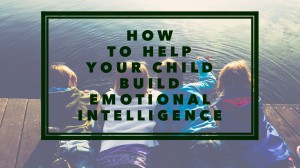 You have probably heard the term ’emotional intelligence’ many times but what exactly is it? And why is it important for kids to develop their emotional intelligence?
You have probably heard the term ’emotional intelligence’ many times but what exactly is it? And why is it important for kids to develop their emotional intelligence?
Emotional intelligence, or emotional quotient (EQ) is a person’s ability to identify, evaluate, control and express emotions. It helps us communicate with others, negotiate situations and develop clear thought patterns.
People with a strong EQ make good leaders and managers and are better at working collaboratively in team environments. According to leading psychologist and author, Daniel Goleman EQ is a more important measure of how successful a person will be than IQ. IQ measures a person’s academic intelligence, whereas EQ measures emotional intelligence – a person’s ability to interact with others or ‘social intelligence’. People with high IQ do not always have social intelligence and so lack the skills to be successful in many current work environments.
Research carried out by the Carnegie Institute of Technology shows that 85 per cent of financial success is due to skills in ‘human engineering’ including your personality, ability to communicate, negotiate and lead and only 15 per cent is due to ‘technical knowledge’. By developing our children’s EQ, we are setting them up to communicate well, develop strong relationships, negotiate tricky situations in the workplace and in life and have empathy for their friends, partners and own children.
Can we teach our children emotional intelligence?
Absolutely. Some kids are much more in tune with their emotional intelligence than others and will be ready to deal with new or different situations and people easily. But others are not and they need us to teach them.
The education system has strongly focused on developing IQ and improving children’s intellectual ability. However, since 1995 when Daniel Goleman’s highlight its importance in his book ‘Emotional Intelligence – Why it can matter more than IQ’, schools have actively combined teaching children to identify their own emotions and perceive emotions around them into the curriculum.
Here are 4 ways to start building emotional intelligence with your child.
1. Help your child recognize their own emotions
Once you help children ‘name’ their own emotions, whether it be frustrated or angry or sad, they can start taking ownership. Here you will not only spell out what they are feeling but in what context it is affecting others. When they are feeling upset or discouraged, ask them what they are feeling or get them to write it down. Do it often so they get to know what it feels like to be sad or angry or frustrated so they can name their own emotion. Don’t forget to do it with good emotions too. My daughters preschool teacher uses bears with emotions on them and the children pick which bear they are feeling and say what made them feel like that. For example, my daughter picked the happy bear because she felt happy feeding the chickens right then.
2. Talk about your own emotions with your child
We often only think about emotions when they are big and hard to deal with, like feeling disappointed or sad or angry and your children will likely know when you are feeling any of these. It is good to tell them how you are feeling at these times and how you react to these feelings as their role model. It is also important to talk about the positive emotions. For example, I am feeling so happy today because we just bought a house. Tell them what it feels like for you. And demonstrate how your emotions might affect theirs. One of the most important things here is to not blame your child for making you angry or sad – they haven’t made you angry – you have made you angry because there was a trigger. This is a hard concept for children to understand, but once they know how to reduce the trigger points, it will be much easier to control their emotions.
3. Recognise the mood or feeling inside your house
The mood and feelings changes within your house. If you have people over, it might feel fun and jubilant. If you wake up on a Sunday morning and the house is quiet, it might feel calm and relaxed. Discuss this with your children. Allow them to recognize the different moods inside your house and see how their own emotions impact what happens in the house. At some stage, especially in the holidays, the mood gets so high it might explode and this is the time you would take your children to the park or break the pattern somehow – discuss this with your children.
4. Recognise the mood or feeling when you go places
Going into a crowded shopping centre will feel different than going to a park. Talk to your kids about the mood of it. A sunny, hot day will feel different to a rainy, cold day and it will be different for each person. As we approach summer, I was asking the kids which season they like best – summer or winter. Two said summer and one said winter so we explored why we liked each better and it came down to memories and activities, but mostly moods. Two liked being outdoors with space to run around and a less crowded atmosphere. One liked to be in the house and playing games with us. Each could explain the feelings or emotions that went with the seasons. Try this activity with new and familiar places you go and at different times. So if you go to the supermarket and it is really busy, ask them what mood they pick up and then if you go and it is really quiet, they will pick up another mood.
Bringing awareness to the emotions and moods that are felt or perceived in different situations helps your child assess the emotional intelligence in situations. If they have just started at a new school, they will know what the mood is or if something changes for the day at school, they will be able to deal with it much more easily after knowing what they feel and how it affects them. They will also be aware of how they pick up the moods of others in their day.
As a school teacher, emotional intelligence is important to have. I needed to be aware of where my class was at emotionally for each different lesson and sometimes, I would just scrap my entire planned lesson and go out for a run if they were unsettled. If they were settled and working hard on something, I would keep it going at the expense of something else. As a mother, it is also important to know where my family is at emotionally and gauge our activities around it.
Building emotional intelligence now will help your child be a good manager, good leader and more importantly able to contribute to a team environment personally and professionally.
Do you struggle with bedtimes in your house? Get Anna’s free eBook How to Put Your Kids to Bed and Keep Them There: 5 Ways to Stress Free bedtime here.
About the Author: Anna Partridge
Anna Partridge is
mum to three beautiful, highly spirited children aged 9, 8 and 5. She created Positive Parenting with Anna Partridge to share the inspirations and joys about raising the next generation and to allow mums to think about the ‘big picture’ of parenting by providing tips and advice to instil the right habits, values and beliefs in their children from the start.
Anna is a Parent Educator, holds a Bachelor of Education (Primary), a Bachelor of Communications and is a regular contribute at Huffington Post. She is privileged to work alongside families to create calm and balance, help raise confident and resilience kids and maintain strong and connected relationships. www.annapartridge.com.







Some great tips. I also think helping kids build their EQ is important, so thank you.
Pleasure @Christine.
Love this! My 3yo is very into talking about feelings at the moment, so your post has given me some guidance on how to make our conversations ‘stick’.
Great time to start @Mumma McD – well done for jumping on it.
Love this post. Since our children were babies we’ve intentionally (& unintentionally) used all these tips to help build their EQ & their resilience. As they have gotten older it’s been a great tool as well for when they have been in new situations (first days back at school, sleeping at a friends house for the first time, going on a new ride, etc) to recognise their nerves & apprehension, verbalise it & seek reassurance or just talk themselves through the nervous lead up. Then after the event has finished they’ll debrief it back to us, how they felt, what they recognised that as a cue for, then the happiness & relief at the end. All without prompting from us because it’s just become such a natural part of conversation in our family.
Thank you for your posting this Anna 🙂
That is so brilliant @Hayley! It really works when you can instil it as a habit early on and clearly that is exactly what you have done. Great to hear!
I’m struggling with this. At the moment the only emotion my 4 year old seems to feel is boredom or overwhelm! 2014 was crazy for us so hopefully some time and TLC will settle it all down 🙂
Thanks for sharing so honestly @Amy. 4 is a funny age when children are searching for independence but not ready for it, which can lead to boredom or overwhelm! Will he be at school this year? Here’s to a calmer 2015 for you.